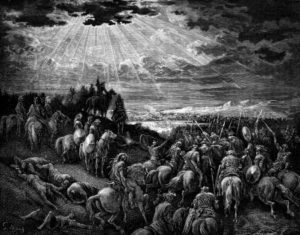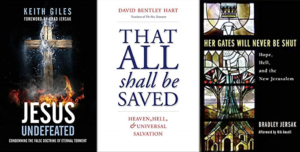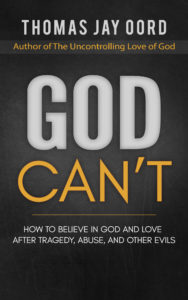The Finally Impenitent
“The finally impenitent are hopelessly and eternally lost.”
The Manual of the Church of the Nazarene includes these ominous words. The phrase “the finally impenitent” was in use prior to the denomination’s beginning. And other Christian groups currently include these words in their belief statements.
“Impenitent” refers to those who do not repent from sin to embrace God’s love. “Hopeless and eternally lost” can be interpreted variously. Many consider the phrase a reference to eternal conscious torment in hell. But being “lost” can mean other things, and biblical writers refer to “lostness” in various ways.
Finally?
I’ve been thinking about the word “finally.” How and when are the impenitent “finally” unrepentant?
I suspect most people think “finally” comes at a person’s death. But this raises many questions.

Do those who have near-death experiences have more than one “finally?” Are those pronounced dead but are later revived spared of “finally?”
Might “finally” come before our bodies die? Can one become finally impenitent at age 5? 12? 25? 55? 99?
Do we get another chance in the afterlife? Is purgatory the process of coming to a “finally impenitent” moment?
When is “finally?”
Does God Give Up?
Even more important is this question: Would an everlastingly loving God decide some people are “finally impenitent?”
Does God say, “Well, I’ve given her 44,837 chances to repent? This next one is the final one?”
Or does God say, “He’s done so many unrighteous acts that I will not resurrect him?” Or “I’ll resurrect her but then annihilate her after judgment?”
I don’t think God ever gives up.
I can’t believe that the God who “gives up” on anyone could be a God of steadfast love. This God does not always forgive. This God does not always turn the other cheek. The love of the God who gives up is love that does not endure forever.
A God who annihilates or sends some to eternal conscious torment is not a God of perfect love.
Universalism?
The phrase “the finally impenitent are hopelessly and eternally lost” does not rule out universalism or the ultimate redemption of all things. We have grounds to hope all will be reconciled.
“Universalism” comes in many forms. Most think of it in terms of a sovereign God accepting all creatures (and all creation?) into eternal bliss or heaven. This accepting God annihilates no one and sends no one to hell.
The universalist view says God forgives us no matter what we’ve done, and we will enjoy everlasting life beyond bodily death.

(For an accessible defense of universalism, see Jesus Undefeated, by Keith Giles. For a much less accessible case for universalism, see That All Shall Be Saved, by David Bentley Hart. Brad Jersak has written a strong biblical appraisal of universalism in Her Gates Will Never Be Shut.)
Problems with Universalism
The usual views of universalism have problems.
First, they ignore the freedom of those who do not want to be with God for eternity. The common view of universalism says, “You may want something else, but you have to embrace the ways of heaven… even if you don’t want to.”
Second, if God has the power to force some into eternal bliss against their will, this God would have the power to prevent evil against the will of those who do evil. The God who can control later has the power to control now… and thereby prevent the genuine evil we experience. And yet we endure genuine evil.
Third, if eternal life in heaven is inevitable for all – no matter what we do – how do our lives matter? Our choices have no ultimate significance if God will rescue us despite ourselves. Our decisions become ultimately meaningless.
Fourth, what real incentive might we have for avoiding evil, fighting corruption, fighting climate change, etc. if none of our efforts ultimately matter? If God sends everyone to eternal bliss, what’s the point of self-sacrifice in the present?
A Better Way
I think there’s a better way to interpret the phrase, “the finally impenitent will be hopelessly and eternally lost.”
This better way says God never gives up calling us to love. God never gives up while we live in these bodies. And God never gives up in the afterlife. God’s steadfast love literally endures forever!
It also says, therefore, that God does not annihilate or send anyone to hell. God never acts to kill or torment. God is not a punisher.
This better way says God doesn’t force anyone into a loving relationship. God always calls, empowers, and inspires us to love. But we can resist, refuse, or not cooperate. And God won’t – in fact, can’t – force us to accept and express love.
Natural negative consequences come from saying no to love. Those natural negative consequences aren’t divinely imposed, as if God spanks us from time to time. Instead, natural negative consequences are simply the destruction that comes from failing to cooperate with God’s life-giving love.
God does not punish; our sins punish us and others. But we can stop sinning and cooperate with the God whose love never ends!
Relentless Love Eschatology
I call the better way I’ve briefly laid out, “Relentless Love Eschatology.” I’ve explained it in various academic presentations. Find an accessible presentation of it in the final chapter of my book God Can’t: How to Believe in God and Love after Tragedy, Abuse, and Other Evils (SacraSage 2019).
Relentless Love Eschatology says God steadfastly loves now and after we die. God’s love always empowers and calls us to respond in love. God literally loves everyone and everything forever!
Those who cooperate with God enjoy the abundant life that comes from loving God, others, and self. Those who don’t cooperate experience the natural negative consequences of saying no to love.
Our mode of existence in the afterlife differs somewhat from our existence now. The Bible and theologians offer diverse speculations about the nature of this existence (spiritual bodies? souls? disembodied minds? other?). But they agree our future state will not endure the evils, death, and destruction that affect our present bodies.
So…
Will Anyone Be “Finally Impenitent?”
Relentless Love Eschatology says God never forces anyone to salvation. So theoretically at least, some may never repent. And God won’t force them.
This isn’t classic universalism.
Because God never gives up on anyone, however, it’s also possible everyone will eventually repent. Resisting may be possible, but God’s relentless love may finally persuade all to embrace love. We have hope but no guarantee all will be saved.
Is it likely everyone and every choosing creature — the whole world — will eventually cooperate with God? Or should we assume at least some choosers will be finally impenitent?

John Wesley seemed to think the whole world would repent. I close with his words:
“In the same manner as God has converted so many to himself, without destroying their liberty, he can undoubtedly convert whole natures or the whole world. And it is as easy for him to convert a whole world as one individual soul.” (General Spread of the Gospel)
Amen!


Comments
Thomas, I always read your posts with great interest, and this one is no exception. In my thinking and writing on this subject, I take a different path but end up in the same place as you do. God desires everyone to accept love and be made new but never compels. But God also has the patience to wait us out. Keep spreading this word because it is the true Good News!
Yes! When does the Lord stop loving and drawing us to Him? Never. We are alive whether in the body or out. We earthly beings put too much emphasis on when the heart stops beating.
Well laid out proposition, Tom. This helps me hope for some who have walked away from the faith. I do suspect that the reasons some persons have rejected Christ, will not let that go, even in afterlife. I think the essence of hell will be living eternally with the direct consequences of our earthly decisions. That being said, people probably reject Love because of their misunderstandings. If Love (Christ) then reveals Truth to them, perhaps they will find the Way and eternal Lifel, Perhaps that is what “every knee shall bow” is all about. Thanks for another great article. Merv
Thank you Tom for posting this. You have a gift for taking the profound and making it a bit more accessible and meaningful for your readers. Love you brother!
Is your position, then, that some people can be “saved” from eternal destruction after the physical death of their mortal bodies? What of Hebrews 9:27-28?
Univeralism, pluralism, annihilationism, inclusivism, post-mortem conversion, purgatory, etc. are certainly proposed theories even held by some evangelicals. I personally believe (along with many adherents giving a credible defense) that everlasting conscious separation (torment, not medieval torture) is biblical, historical, orthodox with death sealing destiny and no post-mortem conversion. As well, in the Church Age, the gospel of Christ/grace is the only hope. This is not contrary to the love or holiness of God.
Tom
I always try to think issues through from the point of view of those who may disagree thus also trying to perceive their objections and their reasoning behind those same objections.
I wonder then given that perhaps we could ask this question, “What evidence is there scripturally that would prohibit the idea of us retaining our free will once this physical existence for us has ended?”
The reason I propose this question is simple. Would it be possible to choose another path once this physical life has ended? If we say a solid NO, then it would seem that for those located in heaven their ability to choose has completely been taken and then also those who have freely chosen to be separate from God. Are they unable to choose? This, to me, would present some very significant challenges to how we view God.
I had a pastor friend who liked to explain it this way, regarding those in heaven, that they would not choose another path as due to their perfect awareness they would be fools to do so. Which to me never adequately explained the free will question. So I look forward to see how we reason this through and still retain an intelligent theology.
Thomas, as always, I appreciate your posts. And I love the term “relentless love eschatology.” just as importantly as with any conclusions, including “hard data” driven summaries must necessarily include a clear understanding of even the simplest of terms like “final.” Thanks for stimulating and provoking analysis. I must consider your position in more detail. (I loved your book – God Can’t.)
I always thought it incongruous that God stopped reaching out to people once their hearts stopped beating or their brain waves stopped waving. But many people I consider saints have believed/do believe that one’s eternal destiny is forever fixed at the moment of physical death. I lean toward second [and more] chances, but I don’t know how we can be sure.
Dr. Oord, taking a cue from a popular reality TV show, I often say that our Infinitely Resourceful God is everlastingly able to outwit, outplay, and outlast our every rebellion, objection, misunderstanding, and fear until every last one of us freely surrenders and releases ourselves into the abyss of Divine Love. At the moment of our self-surrender and release, we will have come to know the Truth, for, as it is written, “God is not willing that any perish, but that all come to a knowledge of the truth.”
Without starting a dialogue I haven’t the time to engage in, (my apologies beforehand; I’m sure it would be enlightening!) I would simply offer to Charles, Todd and Phil these two thoughts that, like the proverbial thread of sweater yarn when pulled, have had the effect for me of unraveling some of my previously-held views on judgment and post-mortem personal conscious decision-making.
First, Heb 9:27-28 is often only partially quoted in a manner that misses the point. Verse 28, I think, is a Christian reconfiguration of the generic v. 27. That is to say, v. 27 is the view apart from Christ (viz., people die [“man” is plural; not “a man”], then the judgment), while v. 28 takes Christ into account (viz., Christ died in a sin-bearing way for all, so when he returns [i.e., “judgment”], there will be celebration because sin will not be part of the calculation). Even if one doesn’t agree with my take here, we really only have a bare sequence of two events in v. 27: people die, then judgment. Nothing is said here about what does or does not happen in the interval.
Second, when Sadducees challenge Jesus with an extended Resurrection puzzle based on levirate marriage (Mt 23:23), Jesus says they don’t know Scripture or the power of God, “I am the God of Abraham, and the God of Isaac, and the God of Jacob’? He is not God of the dead, but of the living.” It strikes me as germane that Jesus’s answer requires all to agree the patriarchs are each individually alive to God in that very moment of Jesus’s speaking. Additionally, the appearance of Moses and Elijah and their conversation with Jesus — these examples suggest (to me, at least) not only post-mortem, pre-judgment “alive-ness,” they support post-mortem, pre-judgment consciousness sufficient to hold meaningful conversation.
If, as many suppose, the wicked in the afterlife are able (nay, consigned!) mindfully to experience shame and regret, and if the righteous are able joyfully to fathom God’s wonders more deeply than before death, it seems to me the capacity of persons to learn and respond remains. And if these capacities remain for both wicked and righteous in the afterlife, I cannot conceive of any objection the righteous would have were God to use them in the wicked to bring them to a knowledge of the truth. Judgment is too consistently portrayed in the OT as a means to a redemptive end for the disobedient, rather than as a punitive end in itself, for me to forswear that final judgment can not have the same redemptive end writ as large as the cosmos.
Such a final, cosmic redemption of all persons and all things is not contrary to the love or holiness of a God.
I like the way you think, Sue!
It sounds like we’re on the same page, Keith!
Thanks, Merv. I share your optimism, which is based on God’s steadfast love!
Thanks for that compliment, Tim! Love you too!
Good question, Charles. A number of people have wrestled with that passage. It can simply mean we no longer have choices as embodied creatures.
Thanks, William. It appears we disagree. But I appreciate your chiming in.
I like that line of reasoning, Todd. By the way, John Wesley believed we retain freedom in the afterlife.
Thanks for your kind words, Robert! I’m happy you find these ideas helpful!
Thanks, Phil. I don’t want to claim I’m sure about my afterlife view. But I do want to claim my view is reasonable. And I think it fits best with the logic of divine love. But I could be wrong! : )
Yes, Bill. I share your hope!
My personal spiritual path has led me in this direction. I vividly recall when, a few decades ago, as a 4th-generation Nazarene, I was taking the Course of Study for Ministers and I read those words as if for the first time: “The finally impenitent are hopelessly and eternally lost.” I went to bed in tears that night. So final! So ominous, as you state. Then years later, when I began attending a Presbyterian church and found fellowship with a few Calvinists as fully-devoted and Spirit-filled as any of my fellow Wesleyan-Arminians, and seeing more and more that one could find verses in the Bible to support both, I began to long for a way to bring these two streams together. Then I came into contact with you, Tom, and your books and teachings. Your definition of God’s nature as “self-giving, others-empowering love” and that love as “relentless,” rings true for me. Recently I have been reading George MacDonald. His novel, Lillith, painted for me a beautiful and convincing picture of that relentless love pursuing and wooing even through eternity. His character longs for complete death, annihilation. “Annihilation itself is no death to evil. Only good where evil was, is evil dead. An evil thing must live with its evil until it chooses to be good. That alone is the slaying of evil.” ― George MacDonald
Reminds me in some respects to CS Lewis Great Divorce. Although it is not a logical presentation but a metaphor.
Yes, Gary, there are real similarities with what Lewis was doing. But I lay out more details.
That’s beautiful, Cathy! Thanks for sharing your kind words and the MacDonald quote!
Thanks for chiming in, Bill!
Love never gives up.
Thomas,
I listened to your interview on The Bible for Normal People. I really enjoyed it. I have been on a spiritual journey myself the past couple of years. I have been in Southern Baptist or Non denominational churches my whole life ( I am 55). I already had issues with the interpretation of how women should serve in the church (in fact our non denominational church was on the edge since we had women in the pulpit!) and in fact the whole complementarian arc was not one I believed . I was also already believing that the whole idea of a person in the Amazon being in eternal torment because they had never heard of Jesus was ridiculous. I was also questioning how we were supposed to not have sadness in Heaven if people we loved weren’t there. So, I was on the way to a huge change. I had an event that happened in July of 2018 that accelerated that journey to places I would never had imagined! My then 22 yo daughter decided to date a young man of Jewish Heritage. She was already struggling with her Christian faith at this point, but as a dutiful person of prayer, I was constantly praying and, of course, had my friends praying she would “see the light”! Well, when she told us that she was not sure of anything in Christianity anymore, I was sick! It started a journey of many days of prayer which were actually me yelling at God. I was totally ready to tell God that I was done with him if the possibility existed that my daughter would not be with me in eternity. This led to counseling with a Christian counselor who gave me the “permission” I needed to look at God differently, to explore different theology, to explore different scriptural interpretation and to finally see God as a truly loving God! The counselor has helped me address why I was so tied to one way of viewing God. What I can say is we are now in a Methodist Church. It has been huge for me! I am so glad that there are people out there talking about this! I read Keith Giles’ blog and I read David Bentley Hart’s book (one needs a thesaurus while reading it!). I do understand that many in the evangelical world have a difficult time leaving eternal torment or annihilationism. I will not try to convince my friends who are still in that camp. I understand that however God works in and through us, it has to be their journey. Thank you for you website!
What a beautiful story, Sherryl! Thanks so much for sharing it! We need a theology that offers a consistent portrait of a loving God!
There is good evidence that many Church fathers reincarnation and that the shed blood of Jesus what eventually Redeem all
Interesting, Josh. I do know that many early Christians were Universalists. But what’s the evidence that they affirmed reincarnation?
If a person doesn’t want to “be with God for eternity,” isn’t that evidence that their view is warped or invalid? Wouldn’t such a person need to be saved from himself? If humanity was created by God to have fellowship with God, then any desire to the contrary would be evidence that something is “broken” with that person and needs to be healed. I’m not sure this is correct, but it seems so to me. Don’t all who die in infancy go to heaven? If free-will is so important, why is it not necessary with infants and young children? If you say that infants all freely choose God, then what has happened between that time and adulthood that causes some to reject God? Is it some kind of damage that would lead a person to reject God?
I have struggled all my life with the fear of hell, ever since I was a small child. It has given me a very harsh view of God, to say the least. I find it difficult to trust Him. The way the gospel is presented (leaving out Calvinism here) is that it ultimately depends on me. I have to respond, my response must be sincere and inevitably it must be proven by “fruit” in my life. Year after year is seek to be saved and free from my fear and to have hope in this depressing life, but I can’t ever seem to get it right.
I hope you are right in what you say in this article.
Great questions, Rob. I’m sorry you have a fear of hell, but I can understand it. In my view, God always loves. And we can choose to respond to that love in this life and the next. Those who die young continue to have possibilities to cooperate with God’s love after death.
Tom